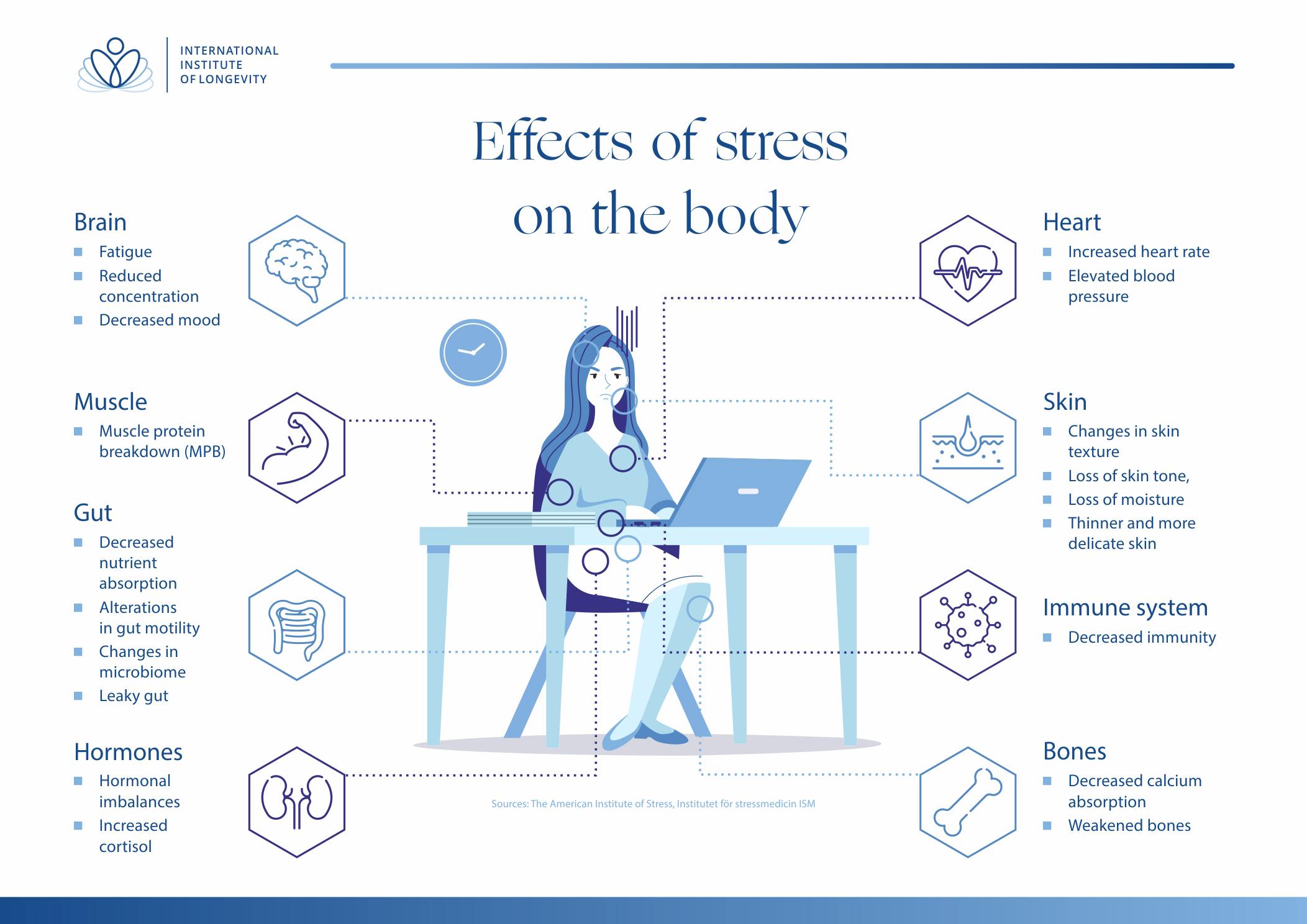Life difficulties, as well as important events and decisions, are prone to produce stress. They bring out all sorts of tensions and anxieties with some of them having the effect of emotionally paralyzing and weakening us (informally referred to as ‘negative stress’). However, some forms of stress can motivate us, help us grow, achieve our goals and follow our dreams. Stress connected to excitement is what some call ‘positive stress’. First dates, getting married, entering a new school or starting a new job are examples of meaningful events that produce stress.
In the short term, anxiety boosts the immune system’s responses. However, prolonged anxiety can have the opposite effect. Cortisol prevents the release of substances that cause inflammation and turns off aspects of the immune system that fight infections, impairing the body’s natural immune response. Chronic inflammation is also associated with an acceleration of the aging process.
Stress is the curse of modern existence and unavoidable in our current era, nevertheless, such descriptions have not helped us to deal successfully with anxiety. It turns out that our attitude toward stress is much more important to our well-being than the actual experience of stress. One of our natural mechanisms to cope with pressure is personal resilience, which helps alleviate anxiety and increase immunity to stress.
Seeing resilience as a skill
What happens when you experience failure, an undesired situation or a setback? What is your initial (usually your default) response to it? What do you focus on, what are your thoughts and how do you choose to act? These are some of the questions that can help you reflect on your personal resilience.
Resilience can be defined as an inner strength that enables you to bounce back when things do not go as planned, often connected to unexpected adversities. Some of us seem to be more resilient than others, due to our genetic makeup. Yet, still a lot depends on how people decide to respond. Resilient people don’t choose to feel like victims of external circumstances. They do not give up easily and if they fail – they bounce back ready to act again. They don’t let situations overwhelm and debilitate them. Nor do they run away from the source of stress or engage in a variety of avoidance mechanisms, such as diverting attention from the issue or, in extreme cases, turn to substance abuse to escape from or block out their disappointment or shame. The ones who persevere learn from their adversities and keep going.
We need to keep in mind that resilience is not about not making any mistakes. It is about how you persevere and what kind of narrative you create to rationalize failure. It is about what you say to yourself about the experience and what you tell others. That story matters, as our lives are highly impacted by the stories we tell ourselves.
It is helpful to look at resilience as a skill. When you look at it that way – you can practice it (and it can be practiced at individual and group levels).
It includes being able to take care of yourself by calming down, looking at events from multiple perspectives, asking for help, learning from what happened, practicing stress management, as well as planning for the future. It is the ability to avoid an all-or-nothing mindset, the practice of comparing oneself to others, and the habit of catastrophic thinking and complaining.

Resilience can be defined as an inner strength that enables you to bounce back when things do not go as planned.
All of the above enables seeing the reality for what it is and then dealing with whatever occurs. It has nothing to do with downplaying the situation or blowing things out of proportion. It helps avoid the very consuming practice of rumination, that is holding on to negative emotions for a long time with the usual “what if…” or ‘if only…” justification. It also reduces the habit of resenting or envying others and bearing grudges for a long time. Quite the opposite, it strengthens compassion and realization that everybody needs support and everybody is expected to give support when others are in trouble.
One of the most important practices that boosts personal resilience is taming inner critics. The best strategy to silence those voices is to have clear personal values – knowing what is important and why it is worthwhile carrying on the work that matters. Even in the presence of inner voices, which may repeatedly distract us by saying that we’re not good enough or that there are others who can do the job better – we need to have the guts to ‘hear’ them, acknowledge them, even thank them for their ‘concern’ and keep on going. We need to remember that we can be our own greatest critics.
To sum up, the factors, that help build resilience, are:
- Knowing your purpose, intention
- Knowing your strengths and focusing on them, rather than focusing on weaknesses
- Taming inner critics and their voices
- Owning the circumstances, even if not totally of our making
- Asking for help
While reflecting upon your own personal resilience – take an example of a recent setback in your life. Think about what went wrong and ask yourself:
In what way was it you who contributed to the issue?
Do you fully own the mistakes you made?
Do you look outside of yourself to find the guilty party?
How would you want the issue to be resolved in the future?
The more you can own your actions, with limited or ‘controlled’ emotional outpouring, the more resilient you are.


